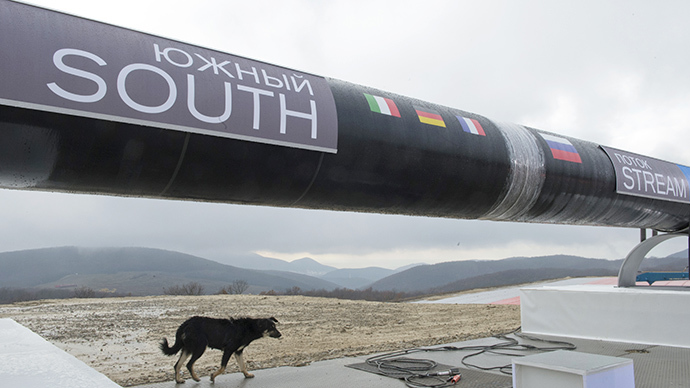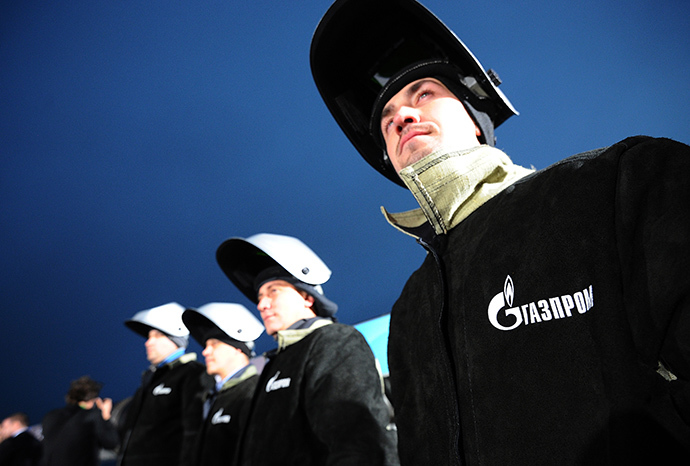South Stream: EU gas or a lot of hot air?

With dizzying renewable energy targets looking increasingly unattainable, the EU is simultaneously seeking to renegotiate the South Stream pipeline which could secure heat for homes across the bloc.
The EU has a Soviet-style weakness for elaborate, centrally-planned projects with distinctly variable results. Sadly, the army of millions of unemployed people in the EU demonstrates the folly of the euro currency, which is currently squandering human capital to ensure, well, whatever it is the euro is supposed to achieve, bearing in mind that prosperity is clearly no longer part of the plan.
Elsewhere, amidst grandiose gray offices, an army of gray civil servants create enormous schemes which hoover up public funds and frequently deliver little in return. Some, rather like Hitler’s stillborn vision for a pan-European broad gauge railway, never go anywhere. With oil, gas and electricity, it seems the EU is on a fast track to chaos with an acute danger of actually running out of energy.
Plausible solutions for the upcoming European energy crisis include nuclear and shale gas. The latter has little support, despite the benefits the US has demonstrated. Nuclear has been subject to setbacks, most notably Angela Merkel’s pious populist volte face post-Fukushima. Europe faces blackouts in the next decade if it does not find alternative sources of power, to make up for those hideously subsidized alternative sources of energy that greens love but actually don’t generate power.
Gas is a natural solution for those looking east and here the EU has been in a form of tortured paranoia for some years. A kneejerk fear of using too much Russian gas seems to dominate policy. Hence one remarkable recent EU folly: Nabucco, a wondrously complex and expensive pipeline to circumnavigate Russia, pumping gas from much less accessible parts.

Meanwhile, several nations are constructing a pipeline that goes under the Black Sea, emerging neatly on the EU’s eastern borders: a simple, workable, relatively cost-effective solution. However, Brussels suddenly appears to have had a fit of nerves just as EU extra-territorial intervention has been writ large in Ukraine. Citing EU competition issues, major stumbling blocks include Gazprom owning both pipeline and gas transported through it, as EU rules nowadays require “unbundling.” However, given that “unbundled” Nabucco failed and Gazprom is funding South Stream, the EU may yet consider pipeline pragmatism better than energy poverty?
The proximity to Kiev avoiding the poisoned chalice of an EU trade deal is remarkable. Ukraine has been a somewhat unreliable partner for gas transit. Its Naftogaz energy company recently owed Gazprom some $1.4 billion for delivered gas. South Stream bypasses Ukraine entirely beneath the Black Sea. The EU may also be wary that a major storage hub in the route is in Serbia. Given that the EU has already helped partition sovereign Serbian territory while proving somewhat cool to accession talks, it is not a quantum leap to presume that the EU might seek to influence Belgrade in the throes of opening negotiations with Brussels.
Note, too, that Gazprom already owns a significant chunk of the European end of the Yamal pipeline through joint ventures. This doesn’t seem to trouble the EU, yet the element of control is highly similar. Meanwhile, just ahead of the South Stream announcement, EU competition authorities cleared a series of asset swaps that gave Gazprom control of more transportation and storage options in Germany. Doubtless, there is a logic in all of these deals, but it is tricky to fully appreciate how one deal is acceptable and another is not. Finally, the EU has offered a way forward whereby Gazprom can apply for an exemption to permit the binding legal agreements already signed between eight nations.
Perhaps Gazprom’s impending negotiations with EU Anti-trust Commissioner Joaquin Almunia over charges it abused its monopoly position (25 percent of the EU market) may be key to a holistic EU negotiation strategy?
Ultimately, EU energy policy is a mess, both at a supranational and individual state level. Saying no to South Stream, while ignoring shale, stymieing nuclear and promoting inefficient renewables is a perfect storm to generate future energy poverty. The issue is no longer whether the last western European could turn off the lights if they choose to leave the disastrous eurozone behind. Rather the question is: will there be any light to turn out if the EU maintains its misguided interventionist energy policies?
The statements, views and opinions expressed in this column are solely those of the author and do not necessarily represent those of RT.
The statements, views and opinions expressed in this column are solely those of the author and do not necessarily represent those of RT.













